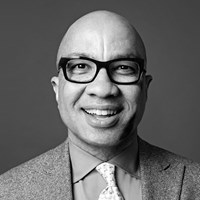By Darren Walker, President, Ford Foundation
TFN member Darren Walker is president of the Ford Foundation, an international social justice philanthropy with a $13 billion endowment and $600 million in annual grant making. He chaired the philanthropy committee that brought a resolution to the city of Detroit’s historic bankruptcy and is co-founder and chair of the US Impact Investing Alliance.
Today on the Ford Foundation’s blog Equals Change, Darren shared his reflections on the Covid-19 virus, the role he thinks funders can play in recovery and our need as a people for caution, courage and calm during these trying times.
“Dear colleagues and friends:
During these strangest of days, one cannot help but feel disoriented.
Our circumstances—and the way we make sense of them—are evolving so rapidly that, even as I draft these lines, I cannot know which will hold true tomorrow or the day after, much less during the weeks and months ahead.
The strangeness takes many different forms. As I work from home—practicing the “social distancing” that the experts counsel—the speed of news, closures, and conference calls is juxtaposed with an unsettling quiet. No one is bustling around my home office the way they would the Ford Foundation corridors.
How can things be moving so fast, and also so slowly?
And yet, I recognize that my lockdown in a Manhattan apartment, while hard for me to process, is certainly no hardship. Those of us who benefit from such privilege would be well served to remember this during the days and months ahead. Far too many are facing real hardships: frontline healthcare professionals, as well as retail, hotel and restaurant workers, and others for whom survival depends on hourly and tipped wages.
And yet, I recognize that my lockdown in a Manhattan apartment, while hard for me to process, is certainly no hardship. Those of us who benefit from such privilege would be well served to remember this during the days and months ahead. Far too many are facing real hardships: frontline healthcare professionals, as well as retail, hotel and restaurant workers, and others for whom survival depends on hourly and tipped wages.
No matter where we find ourselves, though, we share the anxiety that comes with staring straight into the unknown—even if we’ve already been living with some elements of this altered reality. In many ways, the COVID-19 crisis is an extreme extension of trends and feelings of uncertainty that have defined the last few years: The unprecedented has become the ordinary, in nearly every facet of life.
Despite all of this, or perhaps because of it, I have been reflecting on the timeless words of Dr. Martin Luther King Jr.:
We are caught in an inescapable network of mutuality, tied in a single garment of destiny. Whatever affects one directly, affects all indirectly.
As the pandemic and its consequences threaten lives and livelihoods, we see—yet again—just how inextricably our fates and fortunes are intertwined. We see how each of us is directly, and indirectly, responsible for those around us.”
Read the rest of his blog here.
About the Author

Darren Walker is president of the Ford Foundation, an international social justice philanthropy with a $13 billion endowment and $600 million in annual grant making. He chaired the philanthropy committee that brought a resolution to the city of Detroit’s historic bankruptcy and is co-founder and chair of the US Impact Investing Alliance.
Before joining Ford, Darren was vice president at the Rockefeller Foundation, overseeing global and domestic programs including the Rebuild New Orleans initiative after Hurricane Katrina. In the 1990s, as COO of the Abyssinian Development Corporation—Harlem’s largest community development organization—he oversaw a comprehensive revitalization strategy, including building over 1,000 units of affordable housing and the first major commercial development in Harlem since the 1960s. Earlier, he had a decade-long career in international law and finance at Cleary Gottlieb Steen & Hamilton and UBS.
Darren co-chairs New York City’s Commission on City Art, Monuments, and Markers, and serves on the Commission on the Future of Rikers Island Correctional Institution and the UN International Labor Organization Commission on the Future of Work. He also serves on the boards of Carnegie Hall, the Smithsonian’s National Museum of African American History and Culture, the National Gallery of Art, Art Bridges, the High Line, VOW to End Child Marriage, the HOW Institute for Society, the Global Steering Group for Impact Investment, and the Committee to Protect Journalists. He is a member of the Council on Foreign Relations and the American Academy of Arts and Sciences, and is the recipient of 13 honorary degrees and university awards, including the W. E. B. Du Bois Medal from Harvard University.
Educated exclusively in public schools, Darren was a member of the first class of Head Start in 1965 and graduated from the University of Texas at Austin, which in 2009 recognized him with its Distinguished Alumnus Award—its highest alumni honor. He has been included on numerous annual media lists, including Time’s annual list of the 100 Most Influential People in the World, Rolling Stone’s 25 People Shaping the Future, Fast Company’s 50 Most Innovative People, and Out magazine’s Power 50.
